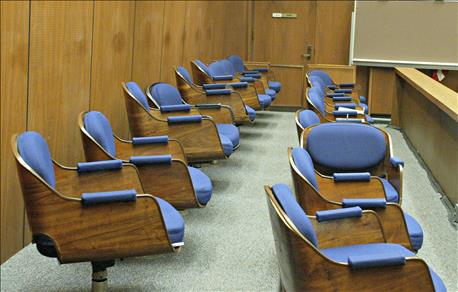
While many people dread the jury duty summons arriving in the mail, I was actually a little excited. It was my first time to go through the jury selection process. My excitement slowly waned as the third hour of questions ticked by. But I believe I know the problem for the four-hour jury selection process I endured--I was from a small town.
You see, in a small town there are many obstacles to overcome for both prosecutors and defense attorneys. I found that there are a few items only experienced in a small town that add time to the jury selection process.
So here are my Top 5 small town time stoppers in the judicial process:

NOT SO COMFY: The seats at my local courthouse were not this plush. However, individuals in small towns endure much harder seats to perform their civic duty as jurors.
1. Time for farming. In this court proceeding, the judge asked if anyone had a problem serving because of work. He noted that an individual may think he or she is the most important person at a job, but that is not always the case. However, he was quick to elaborate on the importance of agriculture and follow with the statement that "We don't want to keep farmers from planting their crops." It would be interesting to know if in a big city, the concept of farming or agriculture is given that kind of respect. I will admit, it was nice to hear. I was okay with taking a little time out to acknowledge its importance.
2. Time for personal relationships. Unlike a large city, in a small town, everyone knows everyone. That fact does not stop at the courthouse door. Many jurors know one another. I personally knew three. So one-by-one, jurors are asked to explain their relationship, whether it is family or social. How often do you see them? Can you make your own judgement? Will the judgement you face cause you harm when you see them in public? And on and on. All of the same questions for a roughly 40-member jury pool. It took 40 minutes to get through the process, but hey, it is easier to sit through the process with friends and neighbors.
3. Time for professional relationships. If you grow up in a small town it is likely you will know the judge. In my county, our children were friends and attended the same school. Then there are jurors who know the defense attorney. An attorney in a small town deals not only with criminal or civil cases, but also wills and trusts. So, it took some time for individuals to divulge his or her professional relationship with the counsel.
4. Time for personal stories. Depending on the case, individuals are asked to comment on how their own personal experiences could influence their ability to remain fair and impartial during the process--positive or negative Potential juror after potential juror recounted their experiences with the situation, which in this case was domestic abuse. My heart ached. It brought to light an issue that is still very real in rural America and remains hidden.
5. Time for jury selection. Actually, this was the shortest part of the process and I think truly sets small town America apart. There was no three-or four-day jury selection process. As the bailiff said, "We are not California." It took just under 15 minutes.
With my potential juror number of 35, I realized from the start that it was doubtful my name would be called. Still, I found the process interesting.
Ultimately, it is good to fulfill your civic duty. I am just glad I was able to do it in a small town, surrounded by those I know.
To my boss-- yep, I went home to complete a 10-hour day. I was on deadline. Proving there is time for jury selection and journalism.
About the Author(s)
You May Also Like






